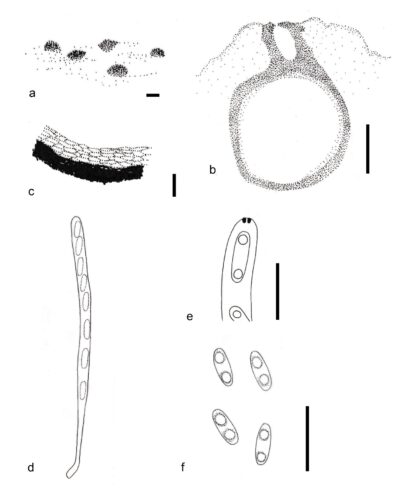Fungalpedia – Note 287, Tenuimurus
Tenuimurus Senan., Camporesi & K.D. Hyde
Citation when using this entry: Perera et al. 2024 (in prep) – Fungalpedia, genera described in 2016.
Index Fungorum, Facesoffungi, MycoBank, GenBank, Fig. 1
Classification: Phomatosporaceae, Phomatosporales, Incertae sedis, Sordariomycetes, Pezizomycotina, Ascomycota, Fungi
Senanayake et al. (2016) introduced the monotypic genus Tenuimurus for T. clematidis based on LSU-SSU-ITS phylogenetic analysis. Tenuimurus clematidis is saprobic in the stems of overwintered plants (Senanayake et al. 2016). The sexual morph of Tenuimurus is characterized by solitary to aggregated and immersed ascomata. They are globose to subglobose, membranous, coriaceous, brown, and develop beneath a tiny blackened clypeus. Ostiole is central and periphysate with a short papilla. The peridium consists of a few inner, hyaline, thick-walled elongated cells and outer, brown, thick-walled, elongated cells. The hamathecium consists of hypha-like, hyaline, filamentous, septate paraphyses that taper distally. Asci are 8-spored, unitunicate, cylindrical, thin-walled, pedicellate, with a refractive, J- apical ring. Ascospores arrange uniseriately. They are ellipsoidal, hyaline, and aseptate with two guttules at the ends. The asexual morph is undetermined (Senanayake et al. 2016).
Type species: Tenuimurus clematidis Senan., Camporesi & K.D. Hyde
Other accepted species: This genus is monotypic
Figure 1 – Tenuimurus clematidis (MFLU 16-1971, holotype). a Appearance of ascomata on substrate. b Cross section of ascoma. c Peridium. d Ascus. e Apical ring. f Ascospores. Scale bars: a = 100 μm, b–d = 50 μm, e, f = 10 μm. Redrawn from Senanayake et al. (2016).
Reference
Entry by
Rekhani Hansika Perera, Center of Excellence in Fungal Research, Mae Fah Luang University, Chiang Rai, 57100, Thailand.
(Edited by Kevin D. Hyde, Samaneh Chaharmiri-Dokhaharani, & Achala R. Rathnayaka)
Published online 28 May 2024
